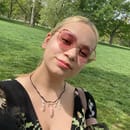Unpopular opinion: I love taking classes that have nothing to do with my major or minor! Every semester, I try to take a course that interests me and has no academic benefit (apart from the knowledge gained). Whether you’re the same and looking for something fun, or you’re trying to combat your credit deficit before graduation, here are some of the most interesting courses I’ve found at Rutgers!
- 370:308 Apiculture (3 Credits)
-
Department: Entomology
Key Points: online assessments, honeybees!, offered each spring, 3-hour course
A class on beekeeping! As a non-major and non-STEM student, this class was so enjoyable to take due to the manageable workload and exciting content. The first few months are spent learning about bee biology and social structures, and around mid-March, the class starts taking field trips to Horticulture Farm 3 to interact with the bees! Assessments are given via Canvas, and there is one major group presentation on a bee-related topic of your choosing. The most fun part of this course is definitely working with the bees, but you also learn valuable information about beekeeping and bee products.
- 988:130 Knowledge and Power: Issues in Women’s Leadership (3 Credits)
-
Department: Women’s, Gender, and Sexualities Studies
Key Points: interesting content (intersectional feminism, decent workload
This course is an introductory-level course for Women’s, Gender, and Sexualities Studies and the Douglass Residential College (DRC) mission course. It dives into topics relating to social justice, women’s movements, intersectional feminist theory, and prominent feminist figures. The workload consists of five short reflection papers (1-2 pages) based on events you attend, a 3-page essay and a 3-5 page essay, two presentations (one individual and one group), weekly readings, and the occasional quiz or discussion board based on the reading. While the course is required for DRC students, you don’t need to be a member of DRC to take it!
- 776:257 Edible and Poisonous Fungi (1 Credit)
-
Department: Plant Science
Key Points: foraging trips!, 55-minute class, offered each fall
I took this course online, so there are likely some differences between how it was organized when I took it versus how it is currently run. In my experience, the course had a light workload, consisting of four field excursions (in which five mushrooms had to be photographed and identified), two Canvas quizzes, a presentation on our favorite fungus, and a 10-minute final presentation on any group of fungi. Classes have the opportunity to forage outside with the professor on field trips around campus. Aside from learning about the very interesting fungi kingdom, my favorite part about this class was going outside and looking at (and sometimes identifying!) various mushrooms that grow on campus!
- 574:310 Gender and Social Change in Korea (3 Credits)
-
Department: Korean, Asian Languages and Cultures
Key Points: focuses on intersectional issues surrounding gender in Korea, discussion-based, reading-heavy
As the title suggests, this course examines various social movements and ideas of femininity, masculinity, modernity, and tradition in Korea from the late 19th century to contemporary times. This class is reading-heavy, with article readings assigned each class period. Other assignments include a weekly discussion post based on the reading, a 1500-word midterm paper, a 20-30 minute presentation, and a final project consisting of a photo essay and a 1500-word paper. While this sounds like a lot, I feel the need to stress that the workload is very manageable and that the content is so interesting that you’ll enjoy the assignments!
- 776:130 Plants and People (3 Credits) (*in-person section with Dr. Robson)
-
Department: Plant Science
Key Points: taste-testing!, light workload, fulfills NS SAS core req, 3-hour class
If you’re looking for a light class to take, this is it! Assignments include four take-home assessments, short TopHat assignments, and a 10-page research paper at the end of the semester. Plus, the course includes several taste-testing sessions for various foods and beverages, such as cranberries, beer, wine, chocolate, and nuts! It fulfills the Natural Science requirement for SAS and is offered both asynchronously and in-person (but the taste tests are only offered to the in-person section).
While these were some of my favorite courses that I’ve taken so far, there are several others that have caught my eye! Here are a few bonus courses that I haven’t taken (yet), but seem unique and exciting from their course descriptions and syllabi:
- 628:230 Basic Scuba Diving (1.5 Credits)
-
Department: Marine Sciences
Key Points: scuba diving!, 7-week course,$300 fee (equipment costs)
The course provides students with the entry-level knowledge and skills necessary to safely participate in SCUBA dives to a depth of 60 feet (18 meters) or shallower. If you’re interested in taking this further (and getting certified!), the Marine Sciences department also offers 628:345-346 Scientific Scuba Diving I & II for three credits each.
- 988:257 Gender and the Body: Representation and Pornography (3 Credits)
-
Department: Women’s, Gender, and Sexuality Studies
Key Points: asynchronous
This course centers queer, women, and trans artists of color and asks: whose bodies and voices are systematically erased from history? How can art bring their stories to light? How can art about sex be a tool for self-determination and a world-making praxis?
- 840:111 The Hero’s Quest: Religion, Mythology, and Harry Potter (3 Credits)
-
Department: Religion
A comparative study of religion focusing on the common theme of the hero’s quest found in the mythologies of major world religions.
There are sooo many fun courses to take at Rutgers, and this list only scratches the surface! I highly recommend taking the time to browse departments/subject areas that interest you and see if they have any courses you’d like to take. While your major is undoubtedly the most important subject to focus on, I strongly encourage taking at least one fun and unrelated course when you have the space!


